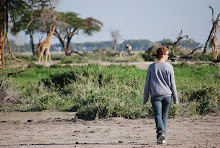I need to meet with Tilahun in the morning, and we must get the final prices from garages for construction material, oh, and I told Yebeletal I’d meet him at 10am, AND I said I would have lunch with him and his wife! Oh Jennifer, you still haven’t asked Peace Corps for a sample project proposal, and you should also send an email to potential donors too…
I continue to toss and turn, not being able to fall asleep or calm my mind from all that is running through it.
About a year ago I think on any average day my mind had to race to think of just something to do, and now the work is abundant. I no longer title my lists, “To Do” but, “Must Do!” I’m not sure when this change occurred, which is usually a sign that it happened gradually, but in this case I feel like my workload quadrupled overnight. I’m teaching the class of girls still, but we’ve combined the classes so it is just twice a week. Thankfully, it is no longer four evenings a week because I now have time to tutor a few primary school boys one day a week. I’m working with HAPCO to start an internet café/photocopy center to benefit 15 orphans. I am trying to help the Anti-Malaria Association with creating an association for the commercial sex workers in town, which I will eventually help write a grant proposal to assist them with changing their work. Finally, I’ve been starting to talk to Health Extension Workers and Traditional Birthing Assistants about having an official training so they can work together in the future.
No wonder my mind is running non-stop.
I am a good bit into “Year 2” now and I finally understand why Peace Corps is a 2-year commitment (27 months to be exact). I remember reading that stipulation and thinking, “wow, that is quite a long time!” Daunting, in fact. The thought of committing to 2 years of anything right out of college is a little much, yet alone saying, “yes, I want to spend the next 2 years in a developing country of your choice, Peace Corps.” And with the roll of a dice, here I am, in Ethiopia.
But I understand now. It could be that I now see each month as a number; the end is in sight and I feel like I have so much left to do, so my jog has turned into a sprint. Except I don’t think that is why I have so much to do right now. I think it truly takes a year to finally settle into your community, to even begin to understand some of the problems here, and finally start to realize how I can help. It takes a year to find counterparts that understand what you’re here to do and who are willing to help you with projects. It takes a year for even a portion of the 36,000 people in urban Dangila to even know that I live here. And apparently it takes a year to finally receive a semi-accurate sounding population statistic for your town!
 |
| Arbay is happy here too! |
I get it. It’s the Year 2 thing. Twelve months ago I wouldn’t have considered extending my contract here. I didn’t understand how someone could consider extending, just because I missed home so much that it was painful. It would be like starting a marathon and in the first mile saying, “why don’t I make it an even 30 miles today?” But once you get towards the end you can consider maintaining that pace a bit longer. That being said, I’m not going to extend my service. However, I would consider it, and even that is a huge change in my frame-of-mind from a year ago.
There are so many differences in Year 1 and Year 2. I don’t think I ever realized there would be before right now. I started thinking of Dangila as home a long time ago, so I never considered it could be more than that. I recently finished the book The Geography of Bliss by Eric Weiner and in the book he ponders the quote from his friend, “I mean, in the end, you come home because this is where you live.” Last year I called Dangila home because it was where I lived. Now I call it home because there are countless families who consider me part of their family, restaurants remember I don’t like sugar in my tea, the kids know my name… but definitely not just because it is where I live.


















